The floor looks clean and bright after mopping. But, once you walk the very first steps over it, you find the problem – there is a telltale sound under your shoes or your barefoot as the floor is very sticky.
“Should I clean the floor all again?” wonder you.
Hold on some minutes …
Read this post by Clairoliviawayman if you still do not know the bottom causes and how to get rid of sticky floors properly.
Table of Contents
Why Is My Floor Sticky After Mopping?
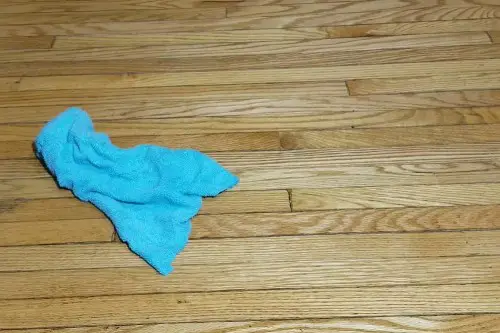
Only when you figure out what results in the frustrating stickiness can you get rid of it quickly. Here are several common reasons.
Stubborn Residue Hard to Remove with Mopping
Most of the time, stickiness is caused by residue left behind the adhesive substances such as soft drink, glue, or grease which by one way or another attached to your floor.
Take the kitchen for example. The grease released by pan frying gets into the air or ends up on the floor. Combining with other chemicals, it causes the oxidizing reaction to happen and results in the sticky stains.
Or, in winter, calcium chloride, as well as salt, is dissolved into water and gets sticky on the floor. The neutral cleaners do not work to break down such chemicals.
Mopping with clean water is not strong enough to dissolve the stain and fight the residue away. In that case, you try to wipe over and over hoping the force take the residue out. Sometimes it works, sometimes not.
Improper Cleaning Techniques
Home caring is an easy task, so does the floor cleaning. It cannot be done by dipping the mop into the water or whatever chemical cleaners, taking it out, and moving around the floor.
You must choose the right cleaning products, as well as clean the right way.
Residual Cleaners
The most common mistake is to buy the wrong cleaners made from chemistries that leave more residue on the floor than others.
For instance, the quaternary disinfectant is popular as an efficient cleaner to kill over harmful pathogens – good for health. However, it is incredibly sticky on the floor without washing out properly.
Too Much or Too Strong Cleaning Chemical
Every chemical cleaner comes with a specifically recommended dilution. Take too much, and you might face nothing but sticky floor disaster. For instance, the soap building up from your frequent cleaning gradually dries and causes the residue to leave behind.
Not to mention, such chemicals can shorten your floor’s durability and firmness.
Clean with Dirty Water
The more you mop, the dirtier the water bucket becomes. When there is noticeable dirt introduced into the bucket, it is time to replace it with a clean one. Otherwise, the floor gets even worse and stickier.
To ease your work, we suggest using a spin mop to get off as much dirt from the mop as possible so that you will take less time and effort to change the water.
Read more: How to Clean Painted Concrete Floors: Easy Way to Clean Painted Floor
How to Clean Sticky Floors
Fortunately, the stickiness will not stay there forever using our effective solutions as follows.
Do More Mopping and Change the Cleaning Solution
In case the problem is noticeable residue from spilling substances (e.g., soft drink, oil, salt), the first thing to do is more cleaning. You should mop over and over the stains to rip them away.
If clean water is not strong enough, try other cleaning solutions. But say no with dubious strong chemicals, a little vinegar or baking soda in your kitchen is enough. Try the recipe: 1 cup of white wine vinegar & 1 gallon of water.
To-do lists:
- Mix the vinegar with the water, and stir for a while
- Soak the rag with the mixture and place it onto the residue
- Leave the cloth there for 15-20 minutes, so the vinegar works to soften the residue
- Clean the sticky areas with a mop
- The floor is expected to be freed from stickiness afterward. If not, try the next stronger solution.
Use Steam Mops instead of Traditional Mops
One useful tool to take out the steam mops, which is good at softening various types of dirt or stains thanks to vaporized water. However, you must adjust the heat carefully to protect your floor from damage. The hot water can break down the glue sealing between the grout lines.
Hence, consult the user guide carefully.
Read: Do Steam Mops Damage Tile Floors? – Helpful Advice On How To Use One!
How to Prevent Sticky Floors After Mopping
Choose Residue-free or Less-residue Cleaners
The residue can come from foreign substances or household cleaners. More cleaning as above might solve the problem temporarily. However, if you do not want the sticky feeling to go back, choose residue-free cleaners.
Unfortunately, not all residue-free solutions are the same in their ingredients so prepare yourself with some knowledge about residue chemicals so that you know what to avoid.
Begley’s Natural Plant-Based Cleaner is the right choice as an ammonia-free solution, especially for sticky hardwood floor.
Use Dilution Control to Take Out the Right Amount of Cleaners
As mentioned above, too much cleaning liquid might result in the stickiness or even ruin your floor. So, you should only use as much as the manufacturer’s recommendation on the label.
Sometimes, the cleaners are super concentrated making it hard to take the right amount. Dilution control will help.
- Safety: The concentrated cleaning amount saves your floor from residue or unwanted damages
- Savings: No more wasteful spills and accurate measurement help you make the most out of the cleaners and save money on buying new cleaners too frequently
Wash and Rinse the Mop Properly
Ensure cleaning tools such as rag, mop, cloth, bucket, etc. are clean before doing the floor cleaning or else you will end up with the messier and stickier floor.
If your floor is relatively clean, one bucket of water is enough. However, on a dirty floor, you must change clean water sometimes. Remember that the sticky residue can act as a glue which readily combines with dirt and dust to generate stickiness, so do the rinsing process carefully.
Whenever detecting noticeable dirty water, you had better dump the sudsy water and rinsed out your mop before mopping it again into the clean water. If the water is dirt-free, the mop is ready to reclean the floor.
Repeat this process until you do not feel any sticky feeling under your shoes or your bare foot.
See also: Best Way To Clean Floors Without A Mop – Excellent Tips
Follow Proper Cleaning Techniques
Different types of the floor might require different cleaning techniques. Keep them in mind so you can relax from a dirty or sticky floor.
Wood Floors
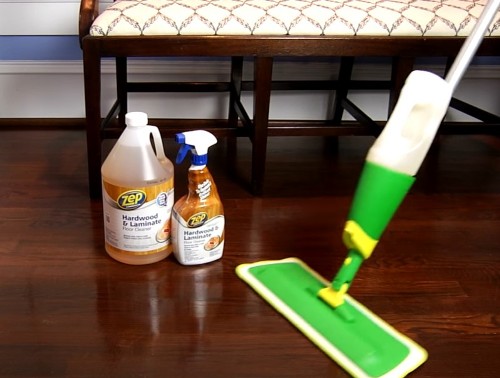
- Daily schedule – Use a microfiber mop or soft cloth to remove dirt, dust, hair, and other particles to protect your floor from surface damage or scratches. This practice also prevents stickiness from building up and become stubborn stains.
- Weekly schedule – Use vacuums or wet mops to access the hard-to-reach areas like corners. Pay extra attention not to damage the floor. For example, the beater bar or wheels of the vacuum can scratch the bar floor. (Read: What Kind Of Vacuum Cleaner Works Well In Corners?)
- Things to consider: place rugs at the high traffic areas to reduce possible dirt and apply protective coverings for furniture on the wood floor.
- Things to avoid: life the mop up off the floor since the dirt might e trapped on the pad. Also, do not use vinegar with water, steam or soap-based cleaners for wood floor.
Tile Floors
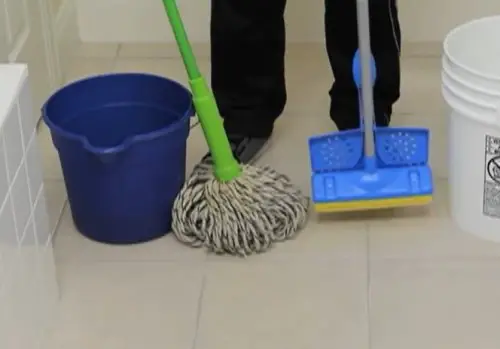
- Sweep or vacuum every other day and before cleaning – Unwanted dirt can introduce into the grout, which is hard to remove. A broom or vacuum is recommended.
- Use mild detergent and clean water.
- Do not use sponge mop unless you want to scratch or ruin the floor’s look
- Change water often as dirty water causes the dirty floor
- Remove residue on noticing hazy buildup: You had better use a non-abrasive all-purpose cleaner to rise with water. Afterward, buff the tile floor using a lint-free cloth
- Ensure the clean grout: Create a natural disinfectant with vinegar and baking soda. Let it sit in the grout lines for 15 to 20 minutes before using a cloth to remove the paste
Read also: Fastest Ways On How To Clean Brick Floors Like A Pro
Vinyl Floors
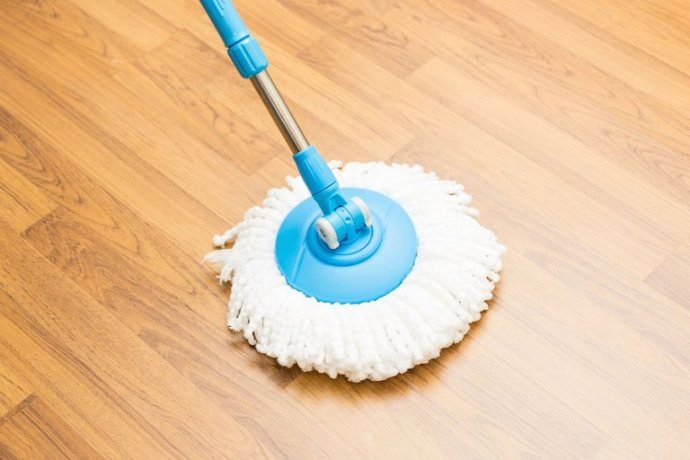
- Use a doormat to keep out the floor from chemicals or dirt from the very first place
- Run a quick soft broom across the vinyl floor every day
- Pick up hairs using the mixture of shampoo and warm water
- Choose the right floor cleaner – No-wax vinyl cleaner is recommended. If you have an older vinyl floor, waxing is acceptable with detergent and warm water
- Avoid drenching the vinyl – Too soaked water can leak into cracks, edges, glue, or seams that loosens and corners to curl
Final Words
Now, you do not need to worry about sticky floors since Clairoliviawayman have already provided you with the most relevant information about why and how to prevent the floor from stickiness.
If you find this post helpful, do not hesitate to like and share with others.
Floor Cleaning Tips – Guides and How To’s:
- How to Make Marble Floors Shine? Polish and Maintain Marble Surfaces
- How To Remove Wood Stain From Concrete – Problem Solved!
- How To Remove Glued Down Carpet Pad From Concrete – Detail Instruction
- How To Steam Clean Concrete Floors [Ultimate Guide]
- How To Make Bamboo Floors Shine? Preventing, Cleaning, And Polishing Processes
- How To Get Rust Off Linoleum – A Few Simple Ways
- Super Easy Steps On How To Clean Cork
- The Ultimate Guide on How to Clean Bird Poop off Concrete
- How To Clean Bird Poop Off Deck – All You Need To Know
- How To Clean Bird Poop Off Brick Properly
- How To Clean Up A Gas Spill In Your Garage Or Driveway Safely
- Things You Should Know: Pros And Cons Of Sealing Concrete Driveway
- How Do You Remove Scratch Marks From Laminate Floors?
- A Detailed Instruction About How To Get Paint Off Laminate Floor
- Find out the Right Answer: Can You Use Fabuloso On Laminate Floors?
- How to Clean and Maintain Laminate Floors
- How To Get Permanent Marker Off Wood Floor? – Step-By-Step Guide From The Experienced!
- Can You Use Clorox Wipes On Hardwood Floors? – Home Care Q&A
- Can You Sweep Hardwood Floors With A Broom – Complete Answer For Housewife
- Can You Use Hydrogen Peroxide To Clean Hardwood Floors? – What You Need To Know
- A Detailed Guide on How to Clean Hardwood Floors After Sanding
- Get The Best Answer – Can I Use Windex On My Hardwood Floors?
- Nine Simplest Steps On How To Make Hardwood Floors Less Slippery
- Can I Use Murphy’s Oil Soap On My Hardwood Floors?
- Is Vinegar Safe On Hardwood Floors?
- What Causes White Spots on Hardwood Floors and How to Remove? – Home Care Q&A
- Can Swiffer Wetjet Be Used On Hardwood Floors? An Insight Answer
- How To Deal With Water Spill On Hardwood Floor? Step-to-step Tutorial For You
- How To Remove Mold From Wood Floors? Step-By-Step Instructions
- Housechore Tips You Can Not Miss: How To Get Wax Off Hardwood Floor?
- Is Pine Sol Good for Hardwood Floors? [Answered]
- How To Clean Old Damaged Wood Floors? A Thorough Guide For You
- How To Get Rid Of Dog Urine Soaked Into Hardwood Floor?
- Can You Use Goof off on Hardwood Floors?
- Can You Clean Wood Floors With Bleach? Is It Safe To Do That?
- Can You Use Bona Hardwood Floor Cleaner On Laminate?
- How To Clean Unfinished Wood Floors (The Secret in The 2nd Section)
- How To Make Tile Floor Shine Without Wax
- How To Remove Paint From Floor Tiles – Problem Solved
- How To Clean Unsealed Grout – A Guide With Easy Methods, And Tips
- How To Clean Dog Urine From Tile Grout – Get Rid Of Stain And Smell
- How To Clean Your Porcelain Tile Floors To Perfection Without Streaks
- How To Remove Rubber Marks From Vinyl Flooring – Foolproof Guidance
- Can I Use A Steam Mop On A Vinyl Floor? – Here Is The Answer
- How To Clean Vinyl Floors With Vinegar – An In-depth Guide from Clairoliviawayman

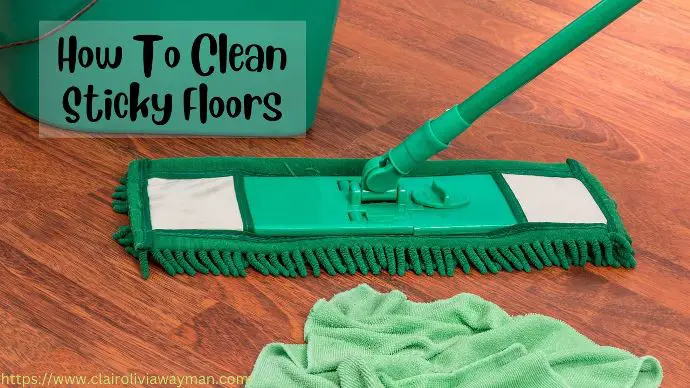
There are times where even if I clean the tile floors in my kitchen, it still feels sticky whenever I step on it even though I’m sure that I already used a mop to tidy it up. Thanks for telling me that this could be caused by residues of soft drinks that might have been left while I was cleaning it. I think I’ll hire someone to clean it for me in case I won’t be able to get it out with anything else.
This all sounds great if you have spots but our entire kitchen floor is sticky. We cleaned up as much of the hummingbird food as we could, it was a rather Large spill. I have washed it twice and gone over it with a damp cloth. I guess I can try the Vinegar but will a cup do an entire floor?